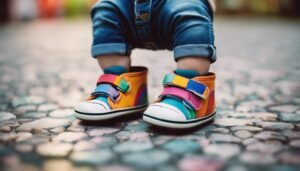Imagine this: you’re standing in the living room, engaged in a casual conversation, when suddenly, you witness a miraculous event. Your baby takes their first steps towards you, a moment filled with wonder and joy.
‘Baby’s First Steps’ is a journey that every parent eagerly awaits. It signifies the beginning of a new chapter in your little one’s life, where they gain independence and explore the world around them.
In this exciting milestone, your baby’s physical and motor skills are put to the test, while their emotional and cognitive growth thrives. As you create a safe environment and support their balance and coordination, you foster their curiosity and encourage their independent exploration.
So, get ready to celebrate and document this remarkable achievement, as your baby takes their first steps towards a world full of possibilities.
Key Takeaways
- Taking first steps is a major milestone in a baby’s development, building strength, coordination, and balance.
- Recognizing signs such as pulling up to stand and taking independent steps helps identify the milestone of first steps.
- Physical development and motor skills, including fine and gross motor skills, are crucial for walking.
- Providing a safe and supportive environment, along with opportunities for standing and practicing walking, encourages physical development and motor skills.
The Significance of First Steps
You will often witness the remarkable significance of your baby’s first steps. These tiny steps mark a major milestone in your baby’s development and are an important part of their physical and cognitive growth. As your baby begins to take their first steps, they aren’t only building strength in their legs, but also developing coordination and balance.
The importance of first steps goes beyond just physical development. It’s a sign that your baby is gaining independence and becoming more confident in exploring their surroundings. Walking opens up a whole new world for your little one, allowing them to interact with their environment in a whole new way.
First steps also play a crucial role in your baby’s cognitive development. Walking requires coordination between the brain and the body, helping to strengthen neural connections and improve overall brain function. As your baby takes those first wobbly steps, their brain is working hard to process information, make decisions, and adapt to their changing environment.
It is important to celebrate and encourage your baby’s first steps. By providing a safe and supportive environment, you can help them build confidence and develop their walking skills. Remember, every baby develops at their own pace, so be patient and enjoy this exciting milestone in your baby’s journey of growth and discovery.
Understanding the Developmental Milestone
How can you recognize the developmental milestone of your baby’s first steps? Understanding milestones and being aware of the signs can help you identify this important milestone in your baby’s development. As a parent, your involvement and support play a crucial role in encouraging and facilitating your baby’s first steps.
To help you better understand the developmental milestone of your baby’s first steps, here is a table summarizing the typical age range and key signs to look for:
| Age Range | Key Signs |
|---|---|
| 9-12 months | Pulling up to stand |
| Cruising along furniture | |
| Taking small steps while held | |
| Standing without support | |
| 12-15 months | Taking independent steps |
| Walking short distances | |
| Walking with arms in the air | |
| Walking with confidence | |
| 15-18 months | Climbing stairs with help |
| Running and climbing | |
| Walking backward | |
| Kicking a ball | |
| 18-24 months | Walking up and down stairs |
| Jumping off a low step | |
| Walking on tiptoes | |
| Walking in a straight line |
Physical and Motor Skills Involved
To understand the physical and motor skills involved in a baby’s first steps, it’s important to recognize the key components of their developing mobility. Physical development plays a crucial role in a baby’s ability to take those first steps. As their muscles grow stronger and their bones become sturdier, they gain the necessary strength and balance to support their own weight. Motor skills, on the other hand, refer to the coordination and control of their movements. Babies need to develop fine motor skills, such as grasping and releasing objects, as well as gross motor skills, which involve larger muscle groups and body movements.
In order to prepare for walking, babies engage in a series of physical milestones. These include rolling over, sitting up, crawling, and pulling themselves up to stand. Each of these milestones helps to enhance their muscle strength and coordination. As they progress through these stages, their motor skills become more refined, enabling them to eventually take those first wobbly steps.
It is important to note that every baby develops at their own pace. Some may start walking as early as 9 or 10 months, while others may take their first steps closer to 15 months. It’s crucial to provide a safe and supportive environment for your baby as they explore their newfound mobility.
Encouraging physical development and motor skills can be done through play. Activities such as tummy time, reaching for toys, and crawling around can help strengthen their muscles and improve their coordination. Providing opportunities for them to practice standing and cruising along furniture can also aid in their journey towards independent walking.
Emotional and Cognitive Growth
During your baby’s first steps, they’ll experience emotional and cognitive growth through their exploration of the world around them. This important milestone not only signifies physical development but also marks a significant period of emotional and cognitive development.
As your baby takes those wobbly steps, here are four ways their emotional and cognitive growth is being nurtured:
Increased Independence: Walking allows your baby to explore their environment more freely, fostering a sense of independence and self-confidence. They start to realize that they can navigate their surroundings and accomplish tasks on their own.
Enhanced Problem-Solving Skills: Walking requires coordination and balance, which challenges your baby’s cognitive abilities. As they learn to navigate obstacles and adjust their movements, they develop problem-solving skills and improve their ability to think critically.
Expanded Social Interaction: Walking opens up a whole new world of social interactions for your baby. They can now actively participate in games, play with peers, and engage in joint activities, which contribute to their emotional and social development.
Language Development: Walking enables your baby to explore their environment and encounter new objects and experiences. This exposure stimulates curiosity and fosters language development as they start to associate words with the things they see and do.
Encouraging Independent Exploration
As your baby takes their first steps, encourage them to explore independently and discover the world around them. This is an important stage in their development as it allows them to build curiosity, foster independence, and gain a sense of confidence in their abilities.
To encourage curiosity, provide a safe and stimulating environment that’s filled with age-appropriate toys, books, and objects for your baby to explore. Allow them to touch, hold, and manipulate objects, as this will help develop their fine motor skills and satisfy their innate curiosity.
Fostering independence is also crucial during this stage. Give your baby the freedom to choose their activities and explore at their own pace. Avoid constantly hovering or intervening, as this can hinder their sense of autonomy and exploration. Instead, offer support and guidance when needed, allowing them to problem-solve and figure things out on their own. Celebrate their little victories and encourage them to keep trying, even when they encounter obstacles.
Remember to create a safe environment by baby-proofing your home, securing heavy furniture, and keeping hazardous items out of reach. Supervise their exploration, but also provide them with the space and opportunity to discover things independently.
Creating a Safe Environment
Ensure the safety of your baby by baby-proofing your home and making it a secure environment for their exploration. Here are some essential safety precautions to take when creating a safe environment for your little one:
Install safety gates: Use safety gates to block off stairs or restrict access to certain areas of your home. This will prevent your baby from falling or getting into hazardous spaces.
Secure furniture and appliances: Anchor heavy furniture, such as bookshelves and cabinets, to the wall to prevent tipping. Use brackets or straps to secure appliances like televisions, ensuring they’re out of reach.
Cover electrical outlets: Babies are curious and love to explore by sticking their fingers or objects into outlets. Install outlet covers or use plug protectors to prevent electric shocks.
Lock cabinets and drawers: Use childproof locks or latches on cabinets and drawers that contain household cleaning products, sharp objects, or medications. This will keep your baby safe from potential harm.
Supporting Balance and Coordination
To support your baby’s balance and coordination, provide them with opportunities for active play and movement. This will not only help them develop these important skills but also enhance their sensory development. Balance exercises are a great way to promote stability and improve coordination in babies. Here are some fun activities you can try with your little one:
| Activity | Instructions |
|---|---|
| Tummy Time | Place your baby on their tummy and encourage them to lift their head and reach for toys. |
| Sit and Reach | Sit your baby on the floor and place toys slightly out of their reach to encourage them to lean and stretch. |
| Crawl and Chase | Create a safe crawling area and let your baby explore by chasing toys or you. |
| Step and Stand | Hold your baby’s hands and help them take steps or practice standing with support. |
Remember to create a safe environment for these activities, with padded surfaces or mats to cushion any falls. As your baby engages in these activities, they will not only strengthen their muscles but also improve their balance and coordination. Encourage their exploration and provide support when needed. With consistent practice, your baby will soon become more confident in their movements and take their first steps in no time.
Celebrating and Documenting This Milestone
Capturing the joy and significance of your baby’s first steps is a memorable way to commemorate this milestone in their development. Here are some celebration ideas and tips for documenting this special moment:
Throw a First Steps Party: Invite close family and friends to celebrate this milestone with you. Decorate the venue with balloons and streamers, and serve baby-friendly snacks. You can also set up a photo booth area with props for guests to capture fun memories.
Create a First Steps Scrapbook: Gather photos, videos, and mementos from your baby’s journey to walking. Include their first pair of shoes, footprints, and any special notes or messages from loved ones. This scrapbook will serve as a beautiful keepsake for years to come.
Take Professional Photos: Hire a professional photographer to capture your baby’s first steps in a natural and artistic way. You can choose a scenic outdoor location or a cozy indoor setting, depending on your preference. These professional photos will be treasured memories.
Make a First Steps Video: Record a video montage of your baby’s first steps and set it to their favorite song or a sentimental tune. Add captions and descriptions to make it even more meaningful. This video will be a cherished reminder of this milestone.
Frequently Asked Questions
How Can I Help My Baby Develop Their Language Skills Alongside Their First Steps?
You can help your baby develop their language skills alongside their first steps by engaging in conversation and using words related to their actions. Talk, sing, and read to them regularly to enhance their communication abilities.
What Are Some Common Challenges That Parents May Face During Their Baby’s First Steps?
During your baby’s first steps, you may encounter common challenges like falls, balance issues, and frustration. It’s important to balance their language development by talking to them, praising their efforts, and offering support.
Are There Any Specific Toys or Equipment That Can Aid in My Baby’s Development of Walking?
Are you wondering if there are any specific toys or equipment that can aid in your baby’s development of walking? Well, there are actually quite a few options available that can help strengthen their gross motor skills and make the process more enjoyable for both you and your little one. From push toys and walkers to activity centers and ride-on toys, there are plenty of choices to consider. These toys and equipment can provide support and stability for your baby as they take their first steps, giving them confidence and encouraging them to keep trying. Additionally, some of these toys incorporate interactive features that can stimulate their language skills and cognitive development while they’re on the move. It’s important to keep in mind that every baby is different, so what works for one may not work for another. Pay attention to your baby’s cues and signs of readiness, and consult with other parents or professionals for recommendations if needed. Remember, this is an exciting milestone for both you and your baby, so enjoy the journey and celebrate their progress along the way!
How Can I Ensure That My Baby Is Developing Their Gross Motor Skills Properly During This Milestone?
To ensure your baby is developing their gross motor skills properly during this milestone, focus on encouraging balance and outdoor exploration. Help them develop their sense of balance and engage in outdoor activities that aid in their gross motor skills development.
What Are Some Signs That My Baby May Be Ready to Take Their First Steps?
You’ll notice certain signs that indicate your baby is ready for their first steps. Look for increased balance, standing and cruising along furniture, and a strong desire to explore their surroundings.
Conclusion
Now that your little one has taken their first steps, a whole new world of exploration awaits them. These tiny steps mark a significant milestone in their development, both physically and emotionally.
By creating a safe environment and supporting their balance and coordination, you can encourage their independent exploration. Celebrate and document this precious moment, as it’s a beautiful reminder of their growth and the incredible journey ahead.
Get ready to witness the wonders that lie beyond those first few steps.




